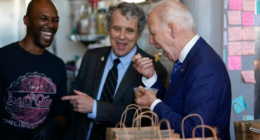Australian actor, author and comedian Jean Kittson’s parents were well-placed to die at home in a retirement village on the NSW Central Coast.
But Kittson and her family were left traumatised after Elaine and Roy ended up in residential care and died in hospital just a month apart in distressing circumstances.
“They didn’t have a good death as a result of the protocols and care,” Kittson told 9news.com.au.

They had been in residential care for only a few weeks of respite but Kittson said this resulted in “awful” deaths for both of them.
Roy, 96, died in a hospital emergency department after suffering a twisted bowel.
She said the care home delayed calling the ambulance “until his pain was unmanageable”.
Her mother had a fall four weeks later and was unable to get antibiotics for the resulting infection, as nobody at the care home could prescribe them.
“I thought we would get palliative care in, that she would get the support she would need and she would manage her death in the best way possible,” Kittson said.
“Instead they said, ‘Well, she can’t die here, we’re calling an ambulance’.”
After 24 hours in the emergency department, Elaine was moved to a cancer ward, as there were no palliative care beds.
The family was given no help, she said.
“My sister and I slept in the chair in the room trying to manage my mother’s dying symptoms,” she said.
“Because we didn’t have the proper care of people who knew what they were doing, we weren’t talking about her about how much we loved her… we were trying to hold her hands while she was struggling.”
Her mother suffered distressing symptoms because she needed a catheter, but this was only done after a palliative nurse checked on her four days later.
Within an hour, Elaine was dead. She was 99.
The ordeal has never left Kittson, who is backing a campaign for change in her role as patron of Palliative Care Australia.

The group says 400 Australians die of a terminal illness each day, but more than three in five do not get specialist end-of-life care at any stage.
Kittson wants to see more training and regulation of palliative care in residential aged care facilities, as well as more community palliative care nurses.
“We all want to age in place and die in place,” she said.
“Mum and Dad were perfectly set up to die at home, but they were given no choice.
“You only need a nurse to pop in, it’s not major funding.”
Camilla Rowland, CEO of Palliative Care Australia, said many other Aussies had a similar story to Kittson.
“What we have seen is that when people and families have access to palliative care, they talk about being able to have a ‘good death’ where pain and symptoms are managed, special moments are shared, and the natural grief that people feel is supported,” Rowland said.
“As opposed to Jean’s experience, which thousands of people have echoed, which could only be described as a ‘bad death’ – where families are scarred by trauma and guilt.
“The aged care sector is under enormous pressure, and the passing of the Aged Care Act late last year is another step in the right direction, but in a practical sense it is still unclear how implementation of the act will fulfil the recommendations of the aged care royal commission which pointed to the need for palliative care to be core business for aged care.”
A spokesman for the Department of Health and Aged Care said it had invested approximately $198.4 million over four years “to strengthen access to quality palliative care, build palliative care workforce capacity and capability and reduce unnecessary hospitalisations”.
Another $4.3 billion will be invested in the government’s new Support at Home program, an end-of-life pathway to support those who have been diagnosed with three months or less to live and wish to remain at home.
The program will replace the Home Care Packages Program and the Short-Term Restorative Care (STRC) Program from July 1.
“A total of $25,000 will be available per eligible participant, to support the increased need for services in the last three months of life,” the spokesman said.
“The pathway will complement palliative care services delivered by states and territories.”






